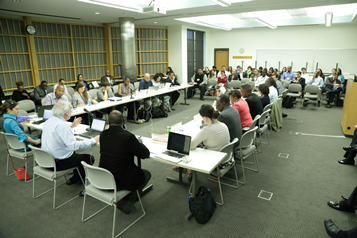Program Spotlight: CURE Scholars Participate in Annual Mock Grant Review to Prepare for Independent Research Careers
, by CRCHD staff
This year’s event was co-chaired by Taofeek K. Owonikoko M.D. Ph.D, Associate Professor at Emory University in Atlanta, Georgia and Cristina Zavaleta, Ph.D., an instructor from Stanford University in Stanford, California. Participating as an observer was Dr. Karyl Swartz, Director, The Center for Scientific Review, NIH Division of AIDS, Behavioral and Population Sciences.
As part of its 2015 Professional Development Workshop, CRCHD held a mock review session for its CURE scholars, trainees, and investigators to enhance their understanding of the grant review process and provide insight on successful grant applications. Seventeen scientists served as reviewers and 30 more scientists participated as observers. The meeting was led by Dr. Robert Freund from The Center for Scientific Review (CSR) at the National Institutes of Health (NIH).
The peer review process forms the cornerstone of the NIH extramural research mission and ensures that applications are evaluated and prioritized based on their scientific merit to receive NIH support. NIH receives more than 85,000 grant applications each year, with about one-third of these applications currently being funded.
According to Dr. Karyl Swartz, CSR reviews approximately 70% of all grant applications and the remaining 30% are reviewed by the 27 NIH institutes. NIH recruits about 18,000 external experts per year to review grant applications.
For many scientific researchers, being funded or not can make all the difference on determining an individual’s academic career at a major university and whether or not they are promoted to receive tenure. A peer review experience is essential for every grant applicant.
“During the mock review, participants have the opportunity to get insights into review processes, as well as how to improve their own grant applications through evaluating the strengths and weaknesses of other applications,” said Dr. Behrous Davani, Program Director at CRCHD who coordinated the 2015 Mock Review. “Participating in the mock review is essential for young investigators to build and enhance their grant writing skills, and as a result, submit competitive NIH grant applications.”
Davani believes “one of the best ways to improve grant writing skills for up-and-coming researchers is to serve as a reviewer and acquire the necessary reviewer knowledge early in their career. CURE scholars who participate in this exercise often go on to become ad hoc reviewers, and later, full members of NIH study sections,” he said.
“Standing study section members are reviewers who are nominated and accepted by NIH to serve on chartered study section,” Dr. Freund explained. “These members agree to participate three times per year over four consecutive years, or two times per year for six years. Temporary members are recruited each council round and serve on an ad hoc basis.”
Dr. Freund continued, “Reviewers are selected for their scientific expertise and by their level of research support, mature judgement, breadth of perspective and impartiality.” In addition, the study section seeks to have reasonable representation of women and minority scientists and contain appropriate geographic distribution,” Freund said.
As part of the 2015 Mock Review, participants and observers had an opportunity to discuss the review process with a panel composed of NCI Program Directors: Behrous Davani, Ph.D., John Ojeifo, M.D., and Tiffany Wallace, Ph.D., all from CRCHD, and Susan A. McCarthy, Ph.D., Division of Cancer Biology, NCI.
The panelists emphasized that careful preparation of applications saves time and resources, and helps investigators build strong, competitive applications. A good first step is a careful read of the funding opportunity announcement (FOA). Investigators were also advised to ensure that their specific research aims can be accomplished within the proposed time and resources, and to discuss their research ideas with colleagues and mentors early in the application process. “These steps can save lots of valuable time,” McCarthy said.
Reflections from 2015 Mock Review Participants
Lorraine Dean, Sc.D., a current CURE K01 grantee from the University of Pennsylvania School of Medicine, participated as a reviewer in the mock review and said, “I always had the sense that the NIH reviewers had secret knowledge of the grant process that I didn’t have. The mock review has demystified the process and energized my resolve to be a successful grant writer.”
Cristina Zavaleta, Ph.D., one of the mock review co-chairs and an instructor of radiology at the Stanford University School of Medicine thought the mock review was “incredibly insightful.” She commented, “If I only knew way back when I applied for my first grant what I know now.”
For Clayton C. Yates, Ph.D., Associate Professor in the Department of Biology and Center for Cancer Research at Tuskegee University, found the mock review to be a “very beneficial experience to increasing my understanding of the grant review process. Now I can make adjustments in my grant applications that will ultimately help me enhance my educational growth and professional development.”
Resources:
- CRCHD Tips & Tools for Applying to Grants
- The NCI Grants Process
- NIH Early Career Reviewer program
- NIH Guide: Writing Your Application
- Videos: NIH Grant Review Process
- Learn more about CRCHD's CURE program.
